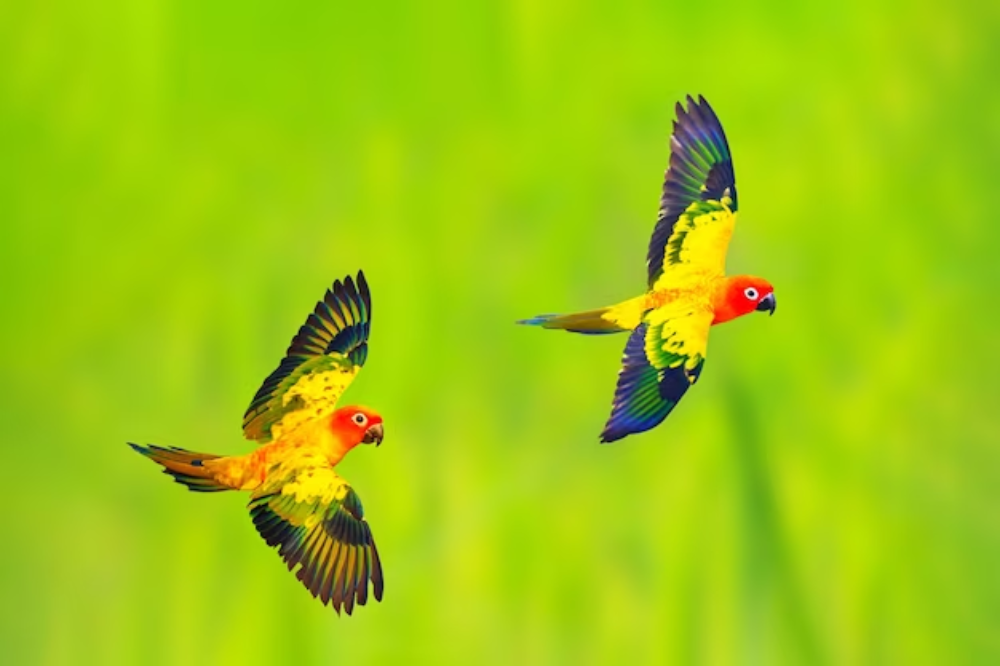Natural Habitat and Distribution
Sun Conures are native to the northeastern regions of South America, primarily found in countries such as Brazil, Guyana, and Suriname. They inhabit tropical and subtropical forests, including both humid lowland forests and dry savannas. These birds are typically found in flocks, ranging from small groups to larger congregations, depending on the availability of food and nesting sites.
Physical Characteristics
One of the most striking features of the Sun Conure is its vibrant plumage. These birds boast a kaleidoscope of colors, with bright yellow feathers covering most of their bodies, complemented by orange and red hues on their faces and throats. Their wings and tail feathers display an array of green and blue, creating a stunning contrast against the warmer tones. Adult Sun Conures typically measure around 12 inches in length and weigh between 100 to 130 grams.

Behavior and Social Structure
Sun Conures are highly social and energetic birds. In the wild, they are often observed engaging in playful activities, such as acrobatics and vocalizations. Their social nature extends to their interactions with humans, making them affectionate and engaging pets. They thrive on social interaction and mental stimulation, often forming strong bonds with their owners.
In the wild, Sun Conures communicate through a variety of vocalizations, including squawks, screams, and melodic calls. These vocalizations serve various purposes, such as signaling danger, attracting mates, and maintaining group cohesion. As pets, they can be quite vocal, which is an important consideration for potential owners, especially those living in apartments or noise-sensitive environments.
Diet and Nutrition
A well-balanced diet is crucial for the health and well-being of Sun Conures. In their natural habitat, they primarily feed on fruits, seeds, nuts, berries, and flowers. As pets, their diet should mimic this diversity, consisting of high-quality pellets, fresh fruits and vegetables, and occasional treats like nuts and seeds. It’s essential to provide a variety of foods to ensure they receive all the necessary nutrients.
Fresh water should always be available, and it’s important to regularly clean their food and water dishes to prevent contamination. Additionally, certain foods, such as avocado, chocolate, caffeine, and alcohol, are toxic to parrots and should be strictly avoided.
Housing and Environment
Providing an appropriate living environment is key to the health and happiness of Sun Conures. A spacious cage is essential, allowing them ample room to move, play, and exercise. The cage should be equipped with perches of varying diameters, toys, and foraging opportunities to keep them mentally stimulated. Regular out-of-cage time is also crucial for their physical and psychological well-being.
Sun Conures are sensitive to temperature changes and drafts, so their living area should be kept in a stable, moderate climate. Additionally, they thrive in a well-lit environment with natural sunlight, which can be supplemented with full-spectrum lighting if needed.
Training and Enrichment
Sun Conures are highly intelligent and can be trained to perform various tricks and behaviors. Positive reinforcement techniques, such as using treats and praise, are effective in teaching them commands and tricks. Basic training can include simple commands like “step up” and “step down,” as well as more complex tricks like retrieving objects or performing acrobatic feats.
Enrichment is vital to prevent boredom and associated behavioral issues. Providing a variety of toys, puzzles, and foraging opportunities can keep them engaged and mentally stimulated. Rotating toys regularly and introducing new challenges can help maintain their interest and curiosity.
Health and Veterinary Care
Regular veterinary check-ups are essential to monitor the health of Sun Conures. Common health issues in these birds include respiratory infections, feather plucking, and nutritional deficiencies. A knowledgeable avian veterinarian can provide guidance on proper diet, care, and preventative measures to ensure the bird’s long-term health.
Owners should also be vigilant for signs of illness, such as changes in appetite, behavior, or feather condition. Early detection and intervention can significantly improve the prognosis for many health issues.
The Joys and Challenges of Keeping Sun Conures as Pets
Owning a Sun Conure can be a deeply rewarding experience. Their vibrant personalities and affectionate nature can bring immense joy and companionship. They are known for their playful antics, ability to mimic sounds, and strong bond with their owners. However, potential owners should also be aware of the challenges.
Sun Conures require a significant time commitment for social interaction, training, and care. Their vocal nature can be noisy, which may not be suitable for all living situations. Additionally, their lifespan of 20 to 30 years means a long-term commitment to their care and well-being.
Conclusion
Sun Conures are captivating creatures that can bring vibrant color and lively energy into the lives of those who choose to share their homes with them. Their intelligence, social nature, and stunning appearance make them both a joy and a challenge to keep. By understanding their natural behaviors, providing a suitable environment, and committing to their care, owners can build a rewarding and lasting relationship with these remarkable birds.









